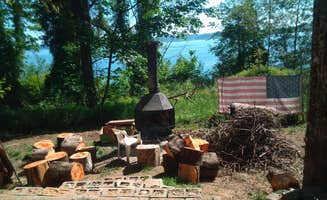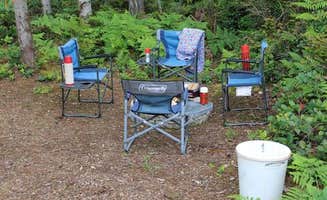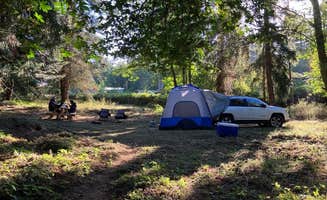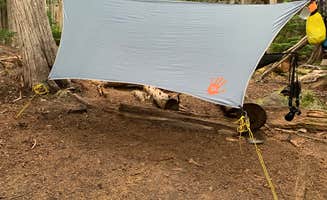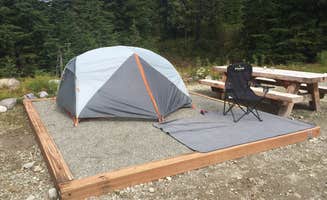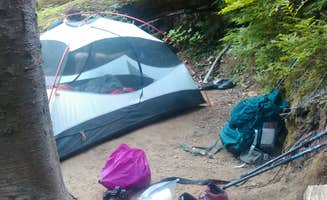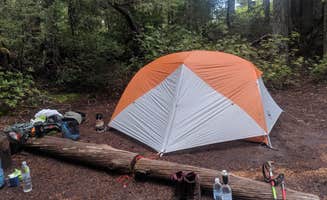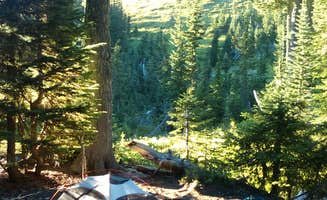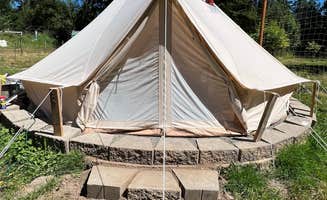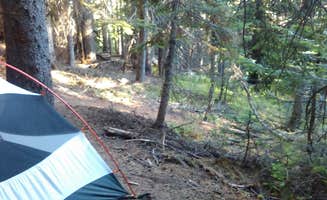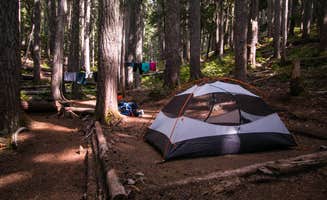Tent campsites near Federal Way, Washington range from primitive riverside spots to boat-access islands within 50 miles. The area's moderate maritime climate keeps summer temperatures between 65-80°F, while winter camping often contends with rainfall averaging 37 inches annually. Most dispersed sites lack facilities beyond fire rings, requiring self-sufficiency for water and waste management.
What to do
Hiking trails at White River Dispersed Camping: Located outside Mount Rainier National Park, these sites offer immediate access to multiple hiking trails. "The second night, I managed to find a spot tucked super far in that had a small private beach. It was farther from the road so you couldn't see or hear anything. I didn't see anyone else the whole afternoon/night," notes one White River Dispersed Camping visitor.
Boating access camping: Several marine campgrounds require boat transportation. A camper at Hope Island Marine State Park Campground explains, "We kayaked here from Boston Harbor on a beautiful summer week-end. Boat-in sites are first-come, first serve so we did not arrive early enough to snatch the few that are right on the water but nonetheless the ones tucked in the forest were still beautiful."
Mountain exploration: The road to Mowich Lake Campground provides views before arrival. "We hiked Spray Fall which was gorgeous. Mowich Lake is close by and the water is so clear and beautiful! Definitely nice to have the lake close by to jump in on a hot day!" reports a visitor. Winter conditions arrive early at higher elevations even during summer months.
What campers like
Riverside camping spots: White River sites provide water sounds that mask road noise. According to one camper, "The campsites are absolutely beautiful—tucked among the trees with stunning views and the soothing, constant sound of the roaring White River nearby. The river noise also does a great job of masking any sounds from the nearby road."
Waterfall proximity: Eagles Roost Camp offers access to waterfalls for both water supply and swimming. "Shortly after the campsite is where we got our water - an incredible waterfall. Also great for a bracing dip," writes one visitor. Waterfall access requires careful footing on sometimes slippery terrain.
Privacy between sites: Several campgrounds offer seclusion between sites. At Eagles Roost Camp, "The sites are spaced out nicely from each other and there is a real feeling of privacy." This contrasts with more crowded lakeside options where sites cluster closer together.
What you should know
Road conditions: Many dispersed and backcountry sites require high-clearance vehicles. A Mowich Lake Campground visitor warns, "The gravel road to get up there, it's like 15 miles long and it's rough. Not the worst road I've ever been on but it wasn't fun and it felt like you had to drive it forever."
Permit requirements: Understand what passes apply to your chosen area. "We have an America Beautiful pass which I highly recommend because it pays off quickly. We were actually able to use that pass for the campground so it only costed $5 a night," notes one Ipsut Creek camper.
Early arrival necessary: First-come, first-served sites fill quickly, especially in summer. A visitor to White River Dispersed Camping reports, "We arrived mid afternoon on a Friday and there were plenty of options to pick from but it did fill up by around 9pm."
Tips for camping with families
Bear safety precautions: Several campsites near Federal Way require proper food storage. At Ipsut Creek Backcountry Campground, "There are several bear poles around the site, so unless you are in site 7 your food and stinky stuff are close by." Teach children about wildlife safety before arrival.
Weather preparedness: Even summer temperatures drop significantly at night in mountain locations. One Mowich Lake visitor advises, "Even in July there is snow and temperatures reached as low as 40F. Fortunately we were prepared, but you may not be."
Site selection for comfort: When camping with children, research site layouts beforehand. A camper at Lena Lake Campground shares, "The sites were nice and flat and had plenty of space for our two tents and four chairs." Consider distance to water sources and toilets when selecting sites with children.
Tips from RVers
Size limitations for boat-in camping: While tent camping options expand with boat transportation, RVs cannot access island campgrounds like Blake Island Marine State Park Campground. "You do need a boat or a ticket on the Argosy to get here, but it's so worth it! It is a peaceful getaway from the hustle and bustle with gorgeous views of the city," notes a visitor.
Limited facilities for larger vehicles: Most dispersed tent campsites near Federal Way lack amenities for RVs. A Green Mountain camper points out, "Very close to Bremerton, Silverdale, Kitsap county. Has about 5 tent spots with picnic tables and fire pit. Had a bathroom but no other amenities- drinking water, shower, firewood/ice for sale."
Road clearance concerns: High-clearance vehicles provide access to more remote locations. At White River Dispersed Camping, one visitor observed: "4x4 / high clearance vehicles recommended - saw some subarus trying to navigate into a cleared area and it was pretty scrape-y."


